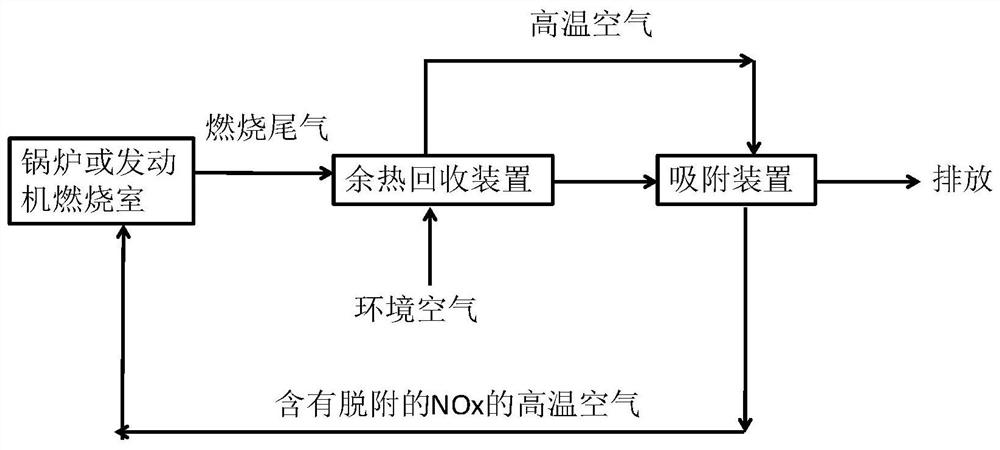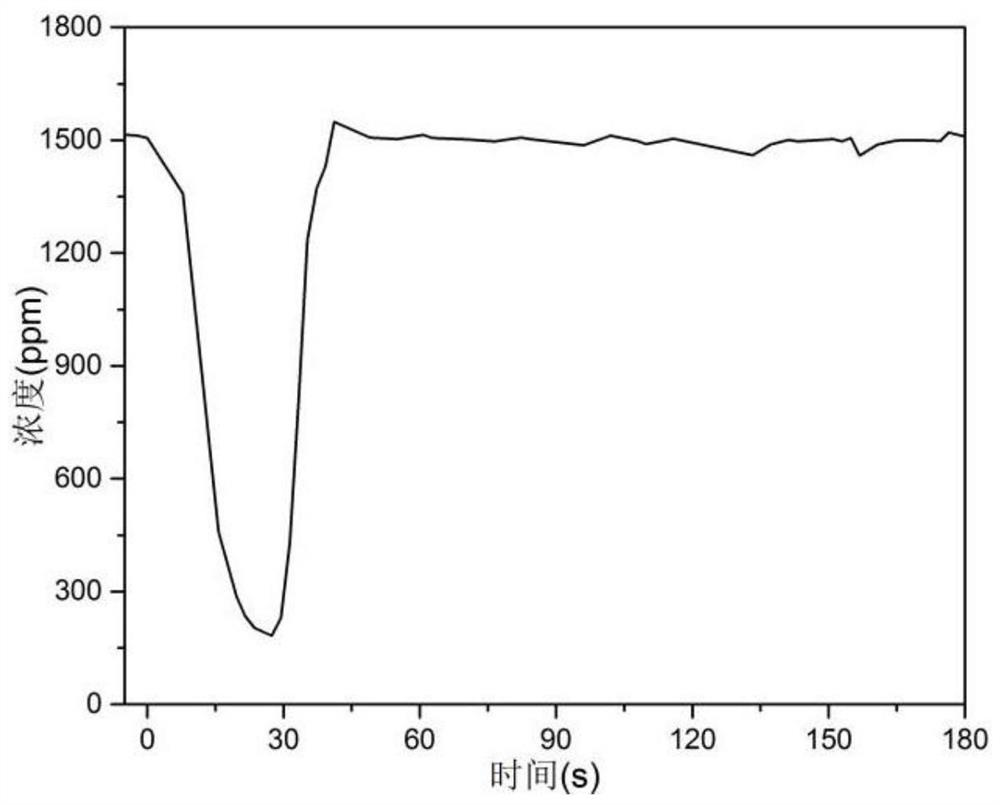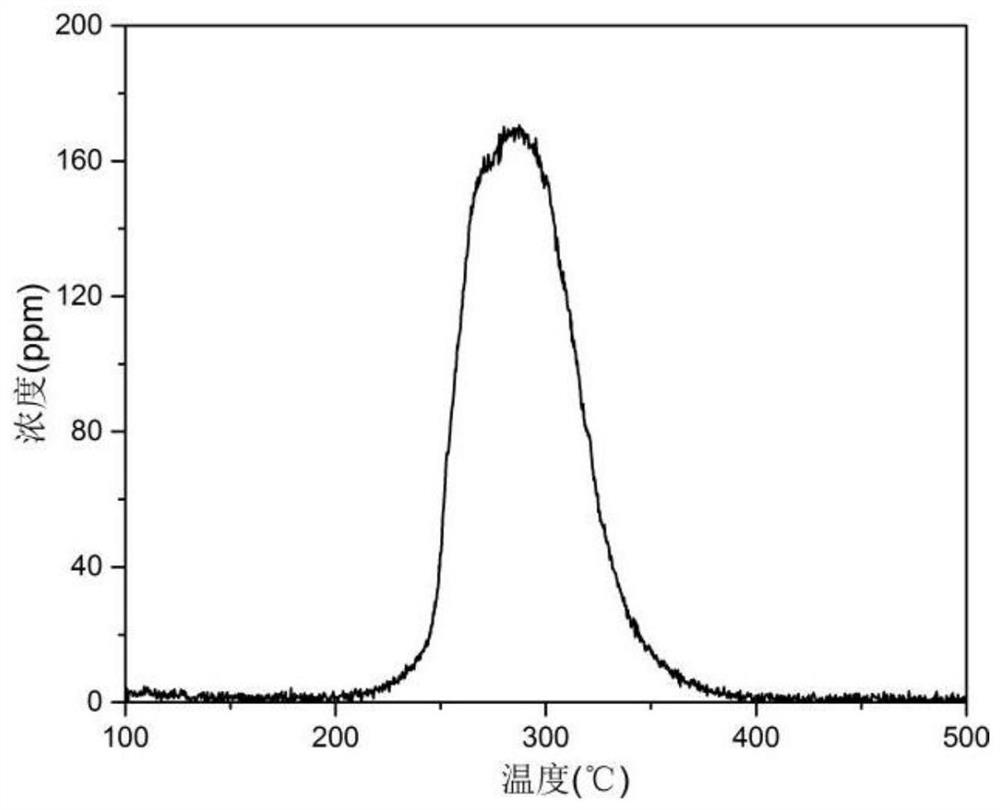A Method for Eliminating and Recycling Nitrogen Oxide in Combustion Tail Gas
A nitrogen oxide and tail gas technology, applied in chemical instruments and methods, separation methods, gas treatment, etc., can solve problems such as high cost of equipment and raw materials, difficulty in meeting the demand for zero emission of nitrogen oxides, complex systems, etc., and achieve raw material And equipment cost reduction, reduce equipment investment cost and maintenance cost, eliminate the effect of NOx pollution
- Summary
- Abstract
- Description
- Claims
- Application Information
AI Technical Summary
Problems solved by technology
Method used
Image
Examples
Embodiment 1
[0040] Take the combustion tail gas discharged from a coal-fired boiler used to smelt silica in a glass factory as an example.
[0041] After the combustion tail gas has been dedusted and desulfurized, it contains 1500ppm NOx, 16.5% CO 2 , 8% O 2 , 11.5%H 2 O, the balance is N 2 . The combustion tail gas sample was taken for experiments, the amount of molecular sieve adsorption material was 0.589g, the total gas flow rate was 900mL / min, the adsorption temperature was 100°C, and the space velocity was 11,000h -1 . The adsorbent used is Ce / Beta means that Ce is loaded on the Beta molecular sieve, and the composition expression method of the remaining adsorbents is similar to this), wherein the percentage content of Ce is 2wt%, and the NOx adsorption results are as follows figure 2 As shown, it takes about 41 seconds to reach adsorption saturation, and the saturated adsorption amount of NOx reaches 32.8 μmol / g adsorbent.
[0042] After the adsorption is saturated, stop fee...
Embodiment 2
[0046] Take the combustion tail gas discharged from a coal-fired boiler in a cement plant as an example.
[0047] After the combustion tail gas has been dedusted and desulfurized, it contains 1000ppm NOx, 12.5% CO 2 , 9.2% O 2 , 6%H 2 O, the balance is N 2 . The combustion tail gas sample was taken for experiments, the amount of molecular sieve adsorption material was 0.288g, the total gas flow rate was 1000mL / min, the adsorption temperature was 150°C, and the space velocity was 25,000h -1 . The adsorbent used is La / Beta, wherein the percentage content of La is 5wt%, and the NOx adsorption results are as follows Figure 4 As shown, the adsorption saturation is reached after about 34 seconds, and the saturated adsorption amount of NOx reaches 33.4 μmol / g adsorbent.
[0048] After the adsorption is saturated, stop feeding the combustion tail gas, and change to feed air into the adsorbent and carry out the temperature-programmed desorption experiment. The results are as fol...
Embodiment 3
[0052] Take the combustion tail gas discharged from a gas-fired boiler in a power plant as an example.
[0053] After the combustion tail gas has been dedusted and desulfurized, it contains 500ppm NOx, 5% CO 2 , 8% O 2 , 5%H 2 O, the balance is N 2 . The combustion tail gas sample was taken for experiments, the amount of molecular sieve adsorption material was 0.144g, the total gas flow rate was 1000mL / min, the adsorption temperature was 80°C, and the space velocity was 50,000h -1 . The adsorbent used is Cu / ZSM-5, wherein the percentage content of Cu is 10wt%, and the NOx adsorption results are as follows Image 6 As shown, the adsorption saturation is reached after about 47 seconds, and the saturated adsorption capacity of NOx reaches 33.6 μmol / g adsorbent.
[0054] After the adsorption is saturated, stop feeding the combustion tail gas, and change to feed air into the adsorbent and carry out the temperature-programmed desorption experiment. The results are as follows: ...
PUM
 Login to View More
Login to View More Abstract
Description
Claims
Application Information
 Login to View More
Login to View More - R&D
- Intellectual Property
- Life Sciences
- Materials
- Tech Scout
- Unparalleled Data Quality
- Higher Quality Content
- 60% Fewer Hallucinations
Browse by: Latest US Patents, China's latest patents, Technical Efficacy Thesaurus, Application Domain, Technology Topic, Popular Technical Reports.
© 2025 PatSnap. All rights reserved.Legal|Privacy policy|Modern Slavery Act Transparency Statement|Sitemap|About US| Contact US: help@patsnap.com



